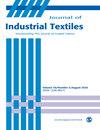Mechanical performance of aramid/glass fiber hybrid weft-knitting-reinforced composites under low-velocity impact
IF 2
4区 工程技术
Q1 MATERIALS SCIENCE, TEXTILES
引用次数: 0
Abstract
In response to the defects of easy delamination, poor impact resistance, and low toughness in laminates, intra-layer aramid/glass hybrid weft-knitted reinforced composites without lamination were designed and prepared. This paper investigated the tensile, bending, and impact response of aramid/glass hybrid weft-knitted reinforced composites. Homogeneous and hybrid composites with glass: aramid hybrid ratios of 1:1, 2:1, 3:1, and hybrid modes of transverse hybrid, oblique hybrid, and vertical interlocking hybrid were prepared by vacuum resin transfer molding (VARTM) technique. The tensile and bending properties were evaluated from stress, modulus, and strain/deflection, and a scanning electron microscope (SEM) was employed. The impact response was analyzed from peak force, maximum displacement, and energy absorption. The results confirm that interlacing brittle glass yarns with aramid yarns exhibits a positive hybrid effect. The ratios of 50%, 33%, and 25% aramid fiber in the transverse hybrid enhanced the longitudinal strength by 72.86%, 52.13%, and 22.01%. The mechanical properties of the oblique hybrid are similar in warp and weft direction; by contrast, the other two hybrid methods demonstrate mechanical anisotropy. This article implements the preparation and mechanical properties research of non-laminated hybrid composites based on weft-knitted structures, which broadens the design and selection of prefabricated components for hybrid composites.芳纶/玻璃纤维混杂纬编增强复合材料低速冲击力学性能研究
针对层合材料易分层、抗冲击性能差、韧性低等缺陷,设计制备了层内无层合的芳纶/玻璃杂化纬编增强复合材料。研究了芳纶/玻璃杂化纬编增强复合材料的拉伸、弯曲和冲击性能。采用真空树脂转移模塑(VARTM)技术制备了玻璃:芳纶混杂比分别为1:1、2:1和3:1、横向混杂、斜向混杂和垂直互锁混杂的均相和混杂复合材料。通过应力、模量和应变/挠度对材料的拉伸和弯曲性能进行了评估,并采用扫描电子显微镜(SEM)进行了分析。从峰值力、最大位移和能量吸收三个方面分析了冲击响应。结果表明,脆性玻璃纱与芳纶纱交织具有良好的杂化效果。在横向杂交种中添加50%、33%和25%芳纶纤维,其纵向强度分别提高72.86%、52.13%和22.01%。斜向混杂材料的力学性能在经纬方向上基本一致;相比之下,其他两种混合方法表现出力学各向异性。本文对基于纬编结构的非层合混杂复合材料的制备及力学性能进行了研究,拓宽了混杂复合材料预制构件的设计与选择。
本文章由计算机程序翻译,如有差异,请以英文原文为准。
求助全文
约1分钟内获得全文
求助全文
来源期刊

Journal of Industrial Textiles
MATERIALS SCIENCE, TEXTILES-
CiteScore
5.30
自引率
18.80%
发文量
165
审稿时长
2.3 months
期刊介绍:
The Journal of Industrial Textiles is the only peer reviewed journal devoted exclusively to technology, processing, methodology, modelling and applications in technical textiles, nonwovens, coated and laminated fabrics, textile composites and nanofibers.
 求助内容:
求助内容: 应助结果提醒方式:
应助结果提醒方式:


